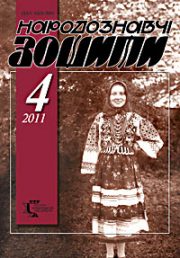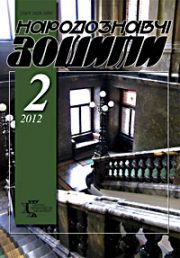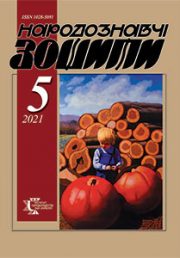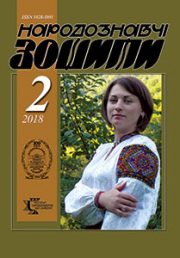The Ethnology Notebooks. 2022. № 1 (163), 243—251
UDK 398.81(477)”2019″
DOI https://doi.org/10.15407/nz2022.01.243
«OUR FATHER IS BANDERA»: PREREQUISITES FOR THE ORIGIN AND PHENOMENA OF POPULARITY OF THE SONG
KHARCHYSHYN Olga
- ORCID ID: https://orcid.org/0000-0002-9379-8300
- Candidate of Philological Sciences (Ph. D. in Philology),
- Senior Researcher at the Ethnology Institute
- of National Academy of Sciences of Ukraine,
- 15, Svobody Avenue, 79000, Lviv, Ukraine,
- Contacts: е-mail: okharchyshyn@gmail.com
Abstract. Formulation of the problem. The article considers the preconditions for the emergence of the modern popular song «Our Father is Bandera» from a folklore point of view. Based on the available folk song samples, it is traced how the image of Stepan Bandera evolved from the time of its appearance in the oral tradition (second half of the 1930s) to the present day and when it acquired the symbolic meaning of «father». The lyrics of the song is analyzed and opinions are expressed about the reasons for its unprecedented popularity. This song has been known since 2019, but became a hit in 2021, after Ukrainian schoolchildren spread it on the social network TikTok.
The object of research is the folk poetic image of Stepan Bandera in folklore, the subject — the symbolic meanings of this image in the song «Our Father is Bandera».
The source base is printed samples of insurgent folklore, own field materials collected during the 2018—2021 expeditions together with my colleague Nadiia Pastukh, phono- and video recordings posted on the Internet. The article proves that the song «Our Father is Bandera» stands on the solid foundation of the insurgent tradition and is a natural manifestation of modern songwriting.
The symbol of Bandera in the role of «father» was established in the XXI century and is the embodiment of great respect for the national hero and all the fighters for the independence of Ukraine. This image, along with «Mother Ukraine», testifies to the evolution of symbolism to a higher degree of generalization of the Ukrainian national idea, Ukrainian identity and succession of generations.
In combination of these images-symbols with the motive of readiness to defend Ukraine by force («we will fight for Ukraine»), a universal poetic formula was created, summarizing the whole experience of insurgent songs. It gave the work «Our Father is Bandera» relevant sound in the modern conditions of the Russian-Ukrainian war.
Keywords: Stepan Bandera, «Our Father is Bandera», insurgent songs, symbol, popularity, tradition, motive, image.
Received 4.02.2022
REFERENCES
- Demyan, G. (2003). Ukrainian insurgent songs of the 1940—2000s (historical and folklore research). Lviv: Institute of Etnology of the National Academy of Sciences of Ukraine [in Ukrainian].
- Demyan, G. (Ed.) (2006). Stepan Bandera and his family in folk songs, legends and memoirs. Lviv: Institute of Etnology of the National Academy of Sciences of Ukraine [in Ukrainian].
- Lunyo, E. (1999). Yavoriv Region on Stepan Bandera. The Leader of OUN in Song Folklore. The Ethnology Notebooks, 1, 32—39 [in Ukrainian].
- Lunyo, E. (2018). Bandera Stepan Andriyovich. Ukrainian folklore encyclopedia (Pp. 37—38). Lviv: Institute of Etnology of the National Academy of Sciences of Ukraine [in Ukrainian].
- Lavryshyn, Z. (Ed.). (1996—1997). Songs of the Ukrainian Insurgent Army (Vol. 25). Toronto; Lviv: Litohys UPA [in Ukrainian].
- Kharchyshyn, O. (Ed.). (2005). Folk song of Zvenigorod region near Lviv. Lviv: Institute of Etnology of the National Academy of Sciences of Ukraine [in Ukrainian].
- Kharchyshyn, O. (1997). Modern changes in the carol repertoire of Lviv region. Folk Art and Ethnography, 1, 29—32 [in Ukrainian].
- Magas, H. (2013). Correlation of Religious and Insurrectional Motifs in Carols of Stryy District. Mythology and Folklore, 1, 54—60[in Ukrainian].
- Kramar, R. (Ed.). (1995). Rebel carols. The songs are collected in Western Podillya. Ternopil [in Ukrainian].
- Yatsun, B. (Ed.). (1995). Singer of the Forest School. Layered songs. Lviv [in Ukrainian].
- Kharchyshyn, O. (2011). Ukrainian song folklore in Lviv ethnoculture: transformational processes, intercultural borders. Lviv: Institute of Etnology of the National Academy of Sciences of Ukraine [in Ukrainian].
- Cheremshyna. Nashe. Lyrics. Retrieved from: https://nashe.com.ua/song/2661 (Last accessed: 20.12.2021) [in Ukrainian].
- Bandera’s voice can be heard in the forest again. Retrieved from: https://vk.com/join?act=fb_start&z=photo-82635462_422100262%2Fwall-82635462_15249 (Last accessed: 20.12.2021) [in Ukrainian].
- Unknown Galician song about Bandera. YouTube. Retrieved from: https://www.youtube.com/watch?app=desktop& v=TiXdZARR2_A (Last accessed: 20.12.2021).
- Orest Luty to Stepan Bandera. YouTube. Retrieved from: https://www.youtube.com/watch?v=v0ytbmO9lFw (Last accessed: 20.12.2021) [in Ukrainian].
- We are guys from Banderstadt. Ukrainian songs. Retrieved from: https://www.pisni.org.ua/songs/640050.html (Last accessed: 20.12.2021) [in Ukrainian].
- Banderstadt. Retrieved from: http://bandershtat.org.ua/interview-with-organizers/(Last accessed: 20.12.2021) [in Ukrainian].
- Kharchyshyn, O. (2006). Insurgent songs in the youth-student repertoire: traditional and new. The way of liberation (Book 11 (704), pp. 70—78) [in Ukrainian].
- (2009). The songbook of the student fraternity. Lviv [in Ukrainian].
- Kuzmenko, O. (2018). Dramatic Human Existence in Ukrainian Folklore: Conceptual Forms of Expression. Lviv: Institute of Etnology of the National Academy of Sciences of Ukraine [in Ukrainian].
- Our Yellow and Blue Flags (FDSK). YouTube. Retrieved from: https://www.youtube.com/watch?v=8NntfHXDBqE (Last accessed: 20.12.2021) [in Ukrainian].
- 10.05.14. Fans of «Dnipro»: «Bandera, Bandera — father, f***ed Putin-Katsap in the ass». YouTube. Retrieved from: https://www.youtube.com/watch?v=PaDzT0qzbmc (Last accessed: 20.12.2021) [in Russian].
- Song of the Ultras in the Army — Bandera — Father. YouTube. Retrieved from: https://www.youtube.com/watch?v=EaiBGa-mIWM (Last accessed: 20.12.2021) [in Ukrainian].
- Our father is Bandera, Ukraine is our mother. Ukrainian songs. Retrieved from: https://www.pisni.org.ua/songs/8387116.html (Last accessed: 20.12.2021) [in Ukrainian].
- Our is Father Bandera. YouTube. Retrieved from: https://www.youtube.com/watch?v=xSSbneF6JsU (Last accessed: 20.12.2021) [in Ukrainian].







